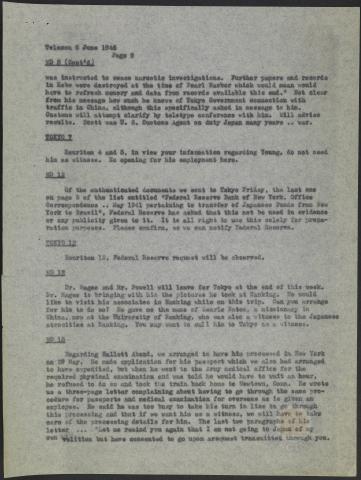
Page 9
| Parent | Teletype Conference June 5, 1946 |
|---|---|
| Date | 5 June 1946 |
| Language | English |
| Collection | Tavenner Papers & IMTFE Official Records |
| Box | Box 3 |
| Folder | General Reports and Memoranda from June 1946 |
| Repository | University of Virginia Law Library |
Telecon 5 June 1946
Page 9
WD-5 (Cont’d)
Was instructed to cease narcotic investigations. Further papers and records in Kobe were destroyed at the time of Pearl Harbor which would mean would have to refresh memory and data from records available to this end.” Not clear from his message how much he knows of Tokyo Government connection with traffic in China, although this specifically asked in message to him. Customs will attempt clarify by teletype conference with him. Will advise results. Scott was U. S. Customs Agent on duty Japan many years . . war.
TOKYO 7
Reuitem 4 and 5, in view your information regarding Young, do not need him as witness. No opening for his employment here.
WD 12
Of the authenticated documents we sent to Tokyo Friday, the last one on page 5 of the list entitled “Federal Reserve Bank of New York, Office Correspondence . . May 1941 pertaining to transfer of Japanese Funds from New York to Brazil”, Federal Reserve h as asked that this not be used in evidence or any publicity given to it. It is all right to use this solely for preparation purposes. Please confirm, so we can notify Federal Reserve.
TOKYO 12
Reuritem 12, Federal Reserve request will be observed.
WD 13
Dr. Magee and Mr. Powell will leave for Tokyo at the end of this week. Dr. Magee is bringing with him the pictures he took at Nanking. He would like to visit his associates in Nanking while on this trip. Can you arrange for him to do so? He gave me the name of Searle Bates, a missionary in China, now at the University of Nanking, who was also a witness to the Japanese atrocities at Nanking. You may want to call him to Tokyo as a witness.
WD 15
Regarding Hallett Abend, we arranged to have him processed in New York on 29 May. He made application for his passport which we also had arranged to have expedited, but when he went to the Army medical office for the required physical examination and was told he would have to wait an hour, he refused to do so and took the train back home to Newtown, Conn. He wrote us a three-page letter complaining about having to go through the same procedure for passports and medical examination for overseas as given an employee. He said he was too busy to take his turn in line to go through this processing and that if we want him as a witness, we will have to take care of the processing details for him. The last two paragraphs of his letter . . . “Let me remind you again that I am not going to Japan of my own volition but have consented to go upon a request transmitted through you.
